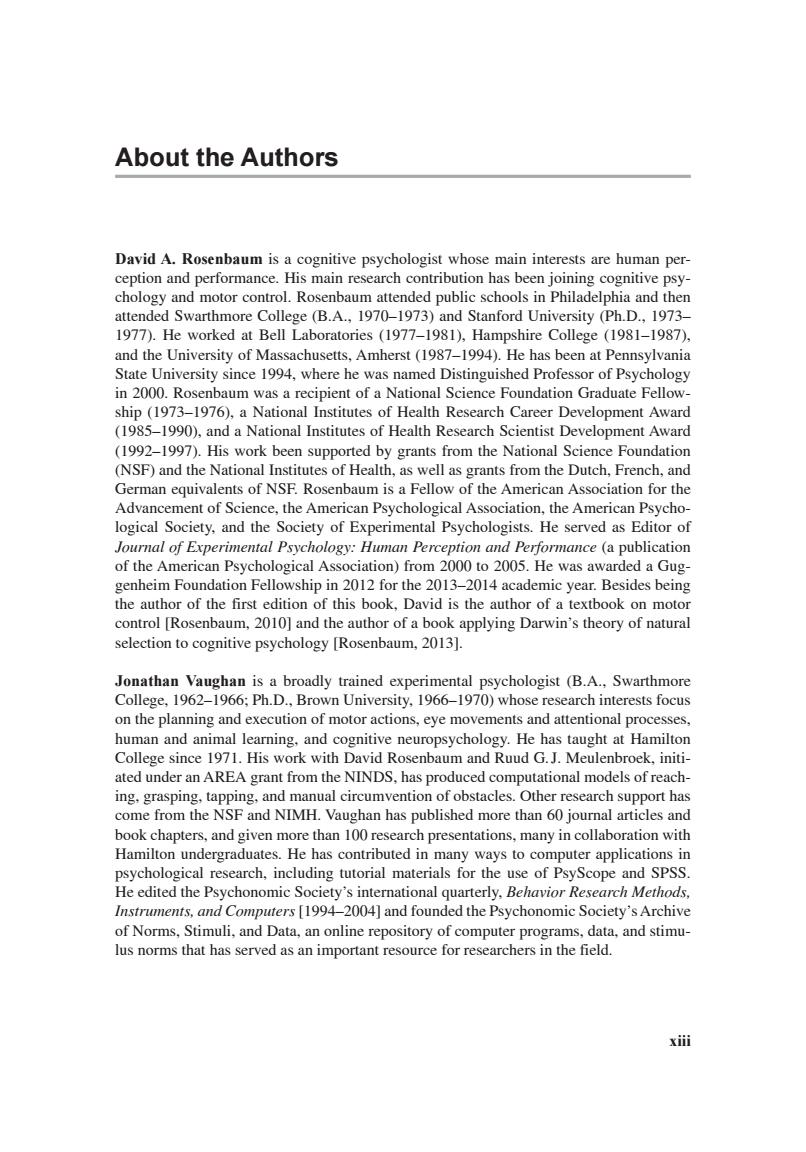正在加载图片...

About the Authors David A.Rosenbaum is a cognitive psychologist whose main interests are human per ception and performance.His main research contribu chold ogy and motor cor aum atten d pu n B 197 sity(P 1 98 niversity of 1994.Heha ce1994, Amherst(19 ennsylvani h en at p in2000 (19731976 enc ad h Co (1985-1990),and a National Institutes of Health Research Scie tist develo 1992-1997.His h nte fro m the nati al oundation SE)and the nat rants fr om the Dutch.Fr ch.and German equivalents of NSF Rosenbaum is a Fellow of the American Association for the Advancement of Science,the American Psychological Association,the American Psycho- logical society and the society of experimental psychologists He served as editor of Journal of Experimental Psvchology:Human Perception and performance (a publication of the american psychological association)from 2000 to 2005.He was awarded a gug. genheim Foundation Fellowship in 2012 for the 2013-2014 academic year.Besides being the author of the first edition of this book,David is the author of a textbook on motor control [Rosenbaum.2010]and the author of a book applying Darwin's theory of natural selection to cognitive psychology Rosenbaum,2013. Jonathan Vaughan is a broadly trained experimental psychologist(B.A.,Swarthmore College. 196 -1966:Ph.D.Brown University.1966-1970)whose research interests focus on the planning and execution of motor actions,eye movements and attentional processe human and anima I le rning.and cognitive neuropsychology He taught at Hamiltor College since 19 His work with Dav senbaum an IRuud G.J. ated under an ARE NINDS. nas pr els of re ing,grasp 0 the Nom. and NIMH. Publishe more tha ven n an I ial of Ps the ps founded the Psvchonomie Society's Archive uli and Data data and stimu ns that has served as an importan resource for res in the field. xixiii About the Authors David A. Rosenbaum is a cognitive psychologist whose main interests are human perception and performance. His main research contribution has been joining cognitive psychology and motor control. Rosenbaum attended public schools in Philadelphia and then attended Swarthmore College (B.A., 1970ă1973) and Stanford University (Ph.D., 1973ă 1977). He worked at Bell Laboratories (1977ă1981), Hampshire College (1981ă1987), and the University of Massachusetts, Amherst (1987ă1994). He has been at Pennsylvania State University since 1994, where he was named Distinguished Professor of Psychology in 2000. Rosenbaum was a recipient of a National Science Foundation Graduate Fellowship (1973ă1976), a National Institutes of Health Research Career Development Award (1985ă1990), and a National Institutes of Health Research Scientist Development Award (1992ă1997). His work been supported by grants from the National Science Foundation (NSF) and the National Institutes of Health, as well as grants from the Dutch, French, and German equivalents of NSF. Rosenbaum is a Fellow of the American Association for the Advancement of Science, the American Psychological Association, the American Psychological Society, and the Society of Experimental Psychologists. He served as Editor of Journal of Experimental Psychology: Human Perception and Performance (a publication of the American Psychological Association) from 2000 to 2005. He was awarded a Guggenheim Foundation Fellowship in 2012 for the 2013ă2014 academic year. Besides being the author of the first edition of this book, David is the author of a textbook on motor control [Rosenbaum, 2010] and the author of a book applying DarwinÊs theory of natural selection to cognitive psychology [Rosenbaum, 2013]. Jonathan Vaughan is a broadly trained experimental psychologist (B.A., Swarthmore College, 1962ă1966; Ph.D., Brown University, 1966ă1970) whose research interests focus on the planning and execution of motor actions, eye movements and attentional processes, human and animal learning, and cognitive neuropsychology. He has taught at Hamilton College since 1971. His work with David Rosenbaum and Ruud G. J. Meulenbroek, initiated under an AREA grant from the NINDS, has produced computational models of reaching, grasping, tapping, and manual circumvention of obstacles. Other research support has come from the NSF and NIMH. Vaughan has published more than 60 journal articles and book chapters, and given more than 100 research presentations, many in collaboration with Hamilton undergraduates. He has contributed in many ways to computer applications in psychological research, including tutorial materials for the use of PsyScope and SPSS. He edited the Psychonomic SocietyÊs international quarterly, Behavior Research Methods, Instruments, and Computers [1994ă2004] and founded the Psychonomic SocietyÊs Archive of Norms, Stimuli, and Data, an online repository of computer programs, data, and stimulus norms that has served as an important resource for researchers in the field